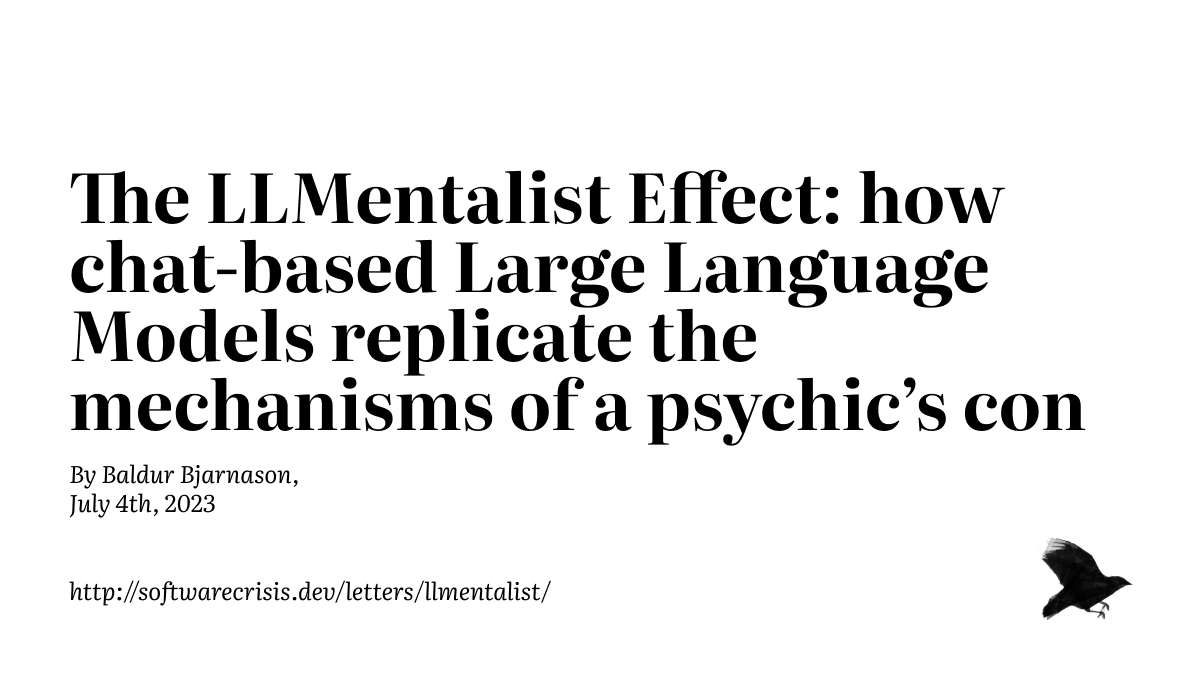Gaywallet (they/it)
I’m gay
- 9 Posts
- 15 Comments

 5·5 days ago
5·5 days agoYou’re welcome to have your own beliefs.
You are not, however, welcome to use those beliefs to invalidate someone else’s lived experience.

 24·5 days ago
24·5 days agoMy fav application is scanning with a phone to immediately get on wifi

 3·12 days ago
3·12 days agoI suppose to wrap up my whole message in one closing statement : people who deny systematic inequality are braindead and for whatever reason, they were on my mind while reading this article.
In my mind, this is the whole purpose of regulation. A strong governing body can put in restrictions to ensure people follow the relevant standards. Environmental protection agencies, for example, help ensure that people who understand waste are involved in corporate production processes. Regulation around AI implementation and transparency could enforce that people think about these or that it at the very least goes through a proper review process. Think international review boards for academic studies, but applied to the implementation or design of AI.
I’ll be curious what they find out about removing these biases, how do we even define a racist-less model? We have nothing to compare it to
AI ethics is a field which very much exists- there are plenty of ways to measure and define how racist or biased a model is. The comparison groups are typically other demographics… such as in this article, where they compare AAE to standard English.

 14·12 days ago
14·12 days agoWhile it may be obvious to you, most people don’t have the data literacy to understand this, let alone use this information to decide where it can/should be implemented and how to counteract the baked in bias. Unfortunately, as is mentioned in the article, people believe the problem is going away when it is not.

 8·17 days ago
8·17 days agoI do want to point out that social media use may be one of the first of these ‘evils’ to meet actual statistical significance on a large scale. I’ve seen meta-analyses which show an overall positive association with negative outcomes, as well as criticisms and no correlation found, but the sum of those (a meta-analyses of meta-analyses) shows a small positive association with “loneliness, self-esteem, life satisfaction, or self-reported depression, and somewhat stronger links to a thin body ideal and higher social capital.”
I do think this is generally a public health reflection though, in the same way that TV and video games can be public health problems - moderation and healthy interaction/use of course being the important part here. If you spend all day playing video games, your physical health might suffer, but it can be offset by playing games which keep you active or can be offset by doing physical activity. I believe the same can be true of social media, but is a much more complex subject. Managing mental health is a combination of many factors - for some it may simply be about framing how they interact with the platform. For others it may be about limiting screen time. Some individuals may find spending more time with friends off the platform to be enriching.
It’s a complicated subject, as all of the other ‘evils’ have always been, but it is an interesting one because it is one of the first I’ve personally seen where even kids are self-recognizing the harm social media has brought to them. Not only did they invent slang to create social pressures against being constantly online, but they have also started to self-organize and interact with government and local authority (school boards, etc.) to tackle the problem. This kind of self-awareness combined with action being taken at such a young age on this kind of scale is unique to social media - the kids who were watching a bunch of TV and playing video games didn’t start organizing about the harms of it, the harms were a narrative created solely by concerned parents.
probably not, in the same way that your grandma calls a video chat a facetime or your representative might call the internet a series of tubes
AI is the default word for any kind of machine magic now

 1·22 days ago
1·22 days agooof, big flaw there

 6·22 days ago
6·22 days agoAny information humanity has ever preserved in any format is worthless
It’s like this person only just discovered science, lol. Has this person never realized that bias is a thing? There’s a reason we learn to cite our sources, because people need the context of what bias is being shown. Entire civilizations have been erased by people who conquered them, do you really think they didn’t re-write the history of who these people are? Has this person never followed scientific advancement, where people test and validate that results can be reproduced?
Humans are absolutely gonna human. The author is right to realize that a single source holds a lot less factual accuracy than many sources, but it’s catastrophizing to call it worthless and it ignores how additional information can add to or detract from a particular claim- so long as we examine the biases present in the creation of said information resources.

 5·26 days ago
5·26 days agoThis isn’t just about GPT, of note in the article, one example:
The AI assistant conducted a Breast Imaging Reporting and Data System (BI-RADS) assessment on each scan. Researchers knew beforehand which mammograms had cancer but set up the AI to provide an incorrect answer for a subset of the scans. When the AI provided an incorrect result, researchers found inexperienced and moderately experienced radiologists dropped their cancer-detecting accuracy from around 80% to about 22%. Very experienced radiologists’ accuracy dropped from nearly 80% to 45%.
In this case, researchers manually spoiled the results of a non-generative AI designed to highlight areas of interest. Being presented with incorrect information reduced the accuracy of the radiologist. This kind of bias/issue is important to highlight and is of critical importance when we talk about when and how to ethically introduce any form of computerized assistance in healthcare.

 4·26 days ago
4·26 days agoah yes, i forgot that this article was written specifically to address you and only you

 2·1 month ago
2·1 month agoIt’s removedING OBVIOUS
What is obvious to you is not always obvious to others. There are already countless examples of AI being used to do things like sort through applicants for jobs, who gets audited for child protective services, and who can get a visa for a country.
But it’s also more insidious than that, because the far reaching implications of this bias often cannot be predicted. For example, excluding all gender data from training ended up making sexism worse in this real world example of financial lending assisted by AI and the same was true for apple’s credit card and we even have full-blown articles showing how the removal of data can actually reinforce bias indicating that it’s not just what material is used to train the model but what data is not used or explicitly removed.
This is so much more complicated than “this is obvious” and there’s a lot of signs pointing towards the need for regulation around AI and ML models being used in places it really matters, such as decision making, until we understand it a lot better.

 295·1 year ago
295·1 year agoI’m not here to proselytize about what we decide to block or not. I’m explaining what the person above is requesting - not a block, but a conscious decision about what shows up on the join-lemmy list.

 295·1 year ago
295·1 year agoI don’t think the people raising this as a concern are trying to solve the problem of bigots on the internet; they are just asking for you to change the advertising you provide to remove the bigots from a place of visibility.

 344·1 year ago
344·1 year agoAnd if the racist is here to cause problems rather than commiserate with fellow racists, they now know exactly which community to avoid, thus restoring moderation problems everywhere. I don’t think anyone is asking you to moderate every instance to ensure they are sticking to your TOS or your viewpoints, but it’s a very minor ask to not showcase off the racists and transphobes and bigots on the ‘join this platform’ page.



I find NFC stickers often require an annoyingly close connection (unless it’s a rather large antenna) and can be particularly finicky with certain cases and other attachments people put on phones. Realistically they both take approximately the same amount of time and it’s way cheaper to print a tag than it is to buy a single NFC sticker